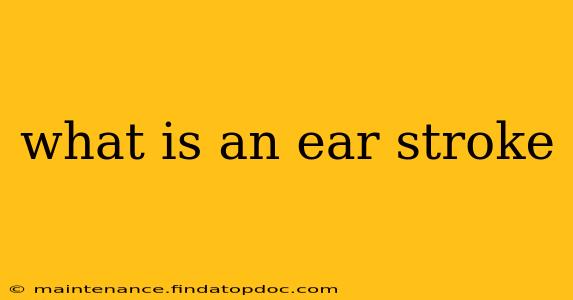The term "ear stroke" isn't a medically recognized term. There's no condition specifically called an "ear stroke." However, hearing loss or other auditory problems can arise from a stroke, specifically one affecting the brain areas responsible for processing sound. This is often referred to as an auditory stroke or stroke-related hearing loss. It's crucial to understand the distinction to avoid confusion and seek appropriate medical attention.
While a stroke doesn't directly impact the ear itself (like a blockage in a blood vessel within the ear), it affects the pathways and brain regions crucial for hearing. Damage to these areas can result in a range of auditory problems, some temporary, others permanent.
What Causes Auditory Problems After a Stroke?
A stroke occurs when the blood supply to part of the brain is interrupted, either by a blocked artery (ischemic stroke) or a ruptured blood vessel (hemorrhagic stroke). The brain areas affected by a stroke vary depending on its location and severity. Areas involved in hearing processing include:
- Auditory cortex: This region in the temporal lobe is responsible for interpreting sounds. Damage here can lead to difficulty understanding speech (auditory processing disorder), difficulty localizing sounds, or changes in sound perception.
- Brainstem: This part of the brain plays a role in transmitting auditory information. Damage can result in hearing loss or reduced auditory sensitivity.
Therefore, hearing problems post-stroke aren't a direct consequence of damage to the ear itself but rather a result of damage to the brain's auditory pathways or processing centers.
What are the Symptoms of Stroke-Related Hearing Loss?
Symptoms of stroke-related hearing loss can vary widely depending on the location and extent of the brain damage. Some common signs include:
- Sudden hearing loss: This can affect one or both ears.
- Difficulty understanding speech (auditory comprehension): This is a common symptom and can significantly impact communication.
- Tinnitus (ringing in the ears): This is a common symptom of stroke, sometimes even preceding it.
- Difficulty localizing sounds: The ability to pinpoint the direction of sounds may be impaired.
- Hyperacusis (increased sensitivity to sound): Some individuals find everyday sounds overwhelming.
- Changes in sound perception: Sounds may be perceived differently, such as being muffled, distorted, or lacking clarity.
Can Stroke-Related Hearing Loss Be Treated?
The treatment for stroke-related hearing loss depends on the underlying cause and the severity of the hearing impairment. Some cases might resolve spontaneously as the brain recovers. However, other cases require interventions like:
- Speech therapy: Helps improve communication skills and compensate for auditory processing difficulties.
- Hearing aids: Can amplify sounds and improve hearing sensitivity if there's a significant hearing loss.
- Cochlear implants: A surgical option for severe hearing loss.
- Assistive listening devices: Tools to improve access to auditory information in various environments.
Early diagnosis and intervention are key for the best possible outcome.
How is Stroke-Related Hearing Loss Diagnosed?
Diagnosing stroke-related hearing loss typically involves:
- Neurological examination: To assess for other signs and symptoms of stroke.
- Audiological evaluation: Hearing tests to determine the type and extent of hearing loss.
- Brain imaging: MRI or CT scans to identify the location and extent of brain damage.
It's essential to see a doctor immediately if you experience sudden hearing loss or other auditory changes, especially after a stroke or suspected stroke.
Is Hearing Loss a Common Symptom After a Stroke?
While not every stroke causes hearing loss, it is a relatively common symptom, particularly among those who experience a more severe stroke. The exact prevalence varies according to the study, but it's a significant concern for stroke survivors and something their healthcare team should be monitoring.
Can a Stroke Cause Tinnitus?
Yes, tinnitus (ringing in the ears) can be a symptom of stroke. It can occur due to damage in the brain areas responsible for auditory processing. The tinnitus might be temporary or persistent depending on the extent and location of the brain damage.
What are the Long-Term Effects of Stroke-Related Hearing Loss?
The long-term effects of stroke-related hearing loss depend on several factors, including the severity of the stroke and the location of the brain damage. Some individuals may experience a full recovery, while others may have persistent hearing impairment that affects their daily lives. Speech therapy and assistive devices can help manage long-term challenges.
This information is for general knowledge and does not constitute medical advice. Always consult a healthcare professional for any health concerns or before making any decisions related to your health or treatment.
